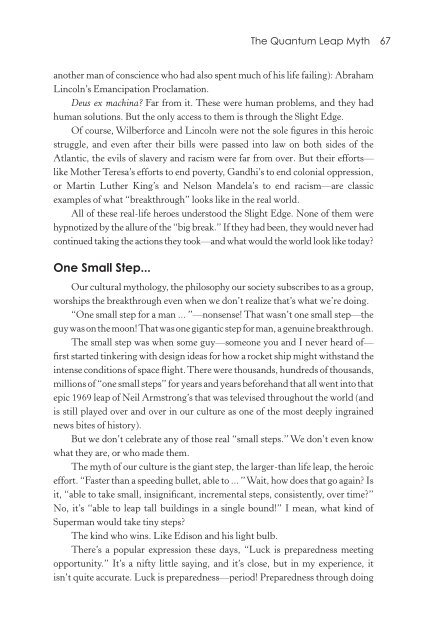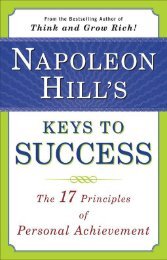The-Slight-Edge
You also want an ePaper? Increase the reach of your titles
YUMPU automatically turns print PDFs into web optimized ePapers that Google loves.
<strong>The</strong> Quantum leap Myth 67<br />
another man of conscience who had also spent much of his life failing): Abraham<br />
Lincoln’s Emancipation Proclamation.<br />
Deus ex machina? Far from it. <strong>The</strong>se were human problems, and they had<br />
human solutions. But the only access to them is through the <strong>Slight</strong> <strong>Edge</strong>.<br />
Of course, Wilberforce and Lincoln were not the sole figures in this heroic<br />
struggle, and even after their bills were passed into law on both sides of the<br />
Atlantic, the evils of slavery and racism were far from over. But their efforts—<br />
like Mother Teresa’s efforts to end poverty, Gandhi’s to end colonial oppression,<br />
or Martin Luther King’s and Nelson Mandela’s to end racism—are classic<br />
examples of what “breakthrough” looks like in the real world.<br />
All of these real-life heroes understood the <strong>Slight</strong> <strong>Edge</strong>. None of them were<br />
hypnotized by the allure of the “big break.” If they had been, they would never had<br />
continued taking the actions they took—and what would the world look like today?<br />
One Small Step...<br />
Our cultural mythology, the philosophy our society subscribes to as a group,<br />
worships the breakthrough even when we don’t realize that’s what we’re doing.<br />
“One small step for a man ... ”—nonsense! That wasn’t one small step—the<br />
guy was on the moon! That was one gigantic step for man, a genuine breakthrough.<br />
<strong>The</strong> small step was when some guy—someone you and I never heard of—<br />
first started tinkering with design ideas for how a rocket ship might withstand the<br />
intense conditions of space flight. <strong>The</strong>re were thousands, hundreds of thousands,<br />
millions of “one small steps” for years and years beforehand that all went into that<br />
epic 1969 leap of Neil Armstrong’s that was televised throughout the world (and<br />
is still played over and over in our culture as one of the most deeply ingrained<br />
news bites of history).<br />
But we don’t celebrate any of those real “small steps.” We don’t even know<br />
what they are, or who made them.<br />
<strong>The</strong> myth of our culture is the giant step, the larger-than life leap, the heroic<br />
effort. “Faster than a speeding bullet, able to ... ” Wait, how does that go again? Is<br />
it, “able to take small, insignificant, incremental steps, consistently, over time?”<br />
No, it’s “able to leap tall buildings in a single bound!” I mean, what kind of<br />
Superman would take tiny steps?<br />
<strong>The</strong> kind who wins. Like Edison and his light bulb.<br />
<strong>The</strong>re’s a popular expression these days, “Luck is preparedness meeting<br />
opportunity.” It’s a nifty little saying, and it’s close, but in my experience, it<br />
isn’t quite accurate. Luck is preparedness—period! Preparedness through doing













